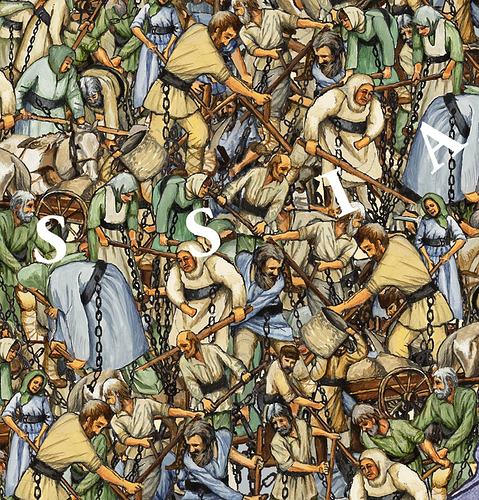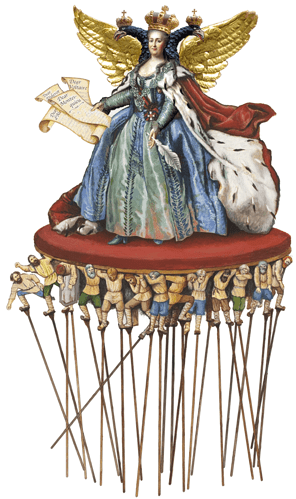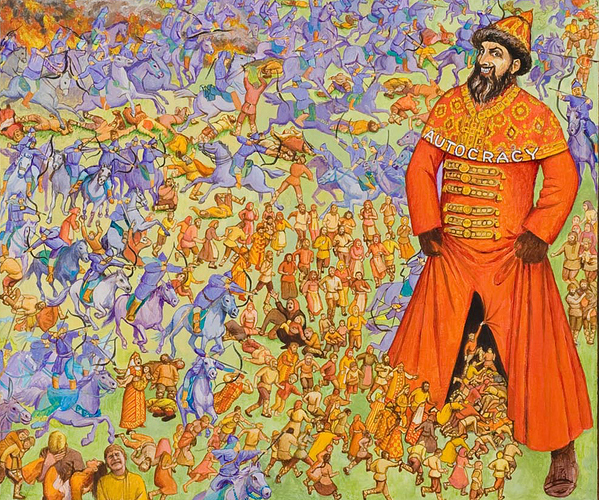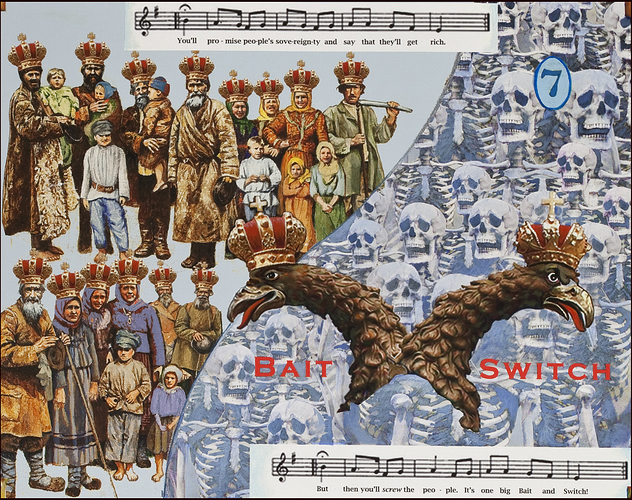SUPERCONVERSATIONS DAY 74: VLADISLAV SURKOV RESPONDS TO ILYA BUDRAITSKIS, “THE EXTRAORDINARY ADVENTURES OF GUY FAWKES”
#How We Can Stop Worrying and Love Putin
Vladimir Putin painting by George Bush (source).
In America, Europe and Asia, decision-makers can be divided into two main groups, differing in their attitude to Russia. Representatives of the first group believe in the promise of our democracy, support us, direct their efforts at the rebirth and strengthening of Russia as an important part of the global geopolitical balance, as an important market for their products, as a good neighbor and reliable ally. The second group consists of those who still live by ‘Cold War’ phobias, who look at our country as a potential enemy, who hinder the implementation of a complete financial blockade of terrorists and their political isolation. They think that they deserve the credit for the fact that Soviet Union’s collapse was almost bloodless and are trying to build on that success. Their goal is the destruction of Russia and the creation of numerous ineffective quasi-state formations on its enormous territory.
I’ll remind you that the virus of terrorism attacked the state at the point when regions, shut in their operetta-type sovereignties, and weak, disposable parties were unable to oppose the chaos which ruled in the country then. Moreover, they frequently provoked it by proceeding from their selfish interests. The period of neo-feudal fragmentation, which we lived through in the 1990s, resulted in the emergence of the bandit-like situations like Chechnya and became a prologue to terrorist intervention. That must not be repeated. I think that mobilization of the nation to fight against terrorism is the most important task. We must all understand that the enemy is at the gates. The front line runs through every town, every street, every house. We must show vigilance, solidarity, mutual assistance, unity of efforts between the citizens and the state.
Fukuyama pointed out in one of his works that post-totalitarian societies are characterized by the deficit of social capital, the habit of joint action, the trust of citizens in each other. Our society is no exception. The moral crisis born in the depths of the pseudo-collectivist communist regime continues even now. The moral majority is forming slowly…
Naturally, there are people with whom we can never form partnership. Now we have a ‘fifth column’ in the besieged country – left-wing and right-wing radicals which both grow on the same branch. False liberals and true Nazis have more and more in common as time goes by. They have common sponsors of foreign origin, common hatred towards ‘Putin-ruled Russia’, as they put it. However, in reality it’s hatred towards Russia as such, which is no wonder, as a matter of fact. Even Dostoyevsky has already written about these people. Today all such ‘Smerdyakovs’ and ‘Lyamshins’[1] sit comfortably in various committees awaiting the defeat of their own country in a war against terror.
What is ‘managed democracy’? a term that has become very popular both inside Russia and outside it. In my opinion, managed democracy is a stereotype model of inefficient – and therefore managed from outside political and economic regimes – model which is forced on all countries and people without any distinction by certain centers of global influence. I will not name now the countries which, as we think, are ‘managed democracies,’ as we define this term. You know these countries yourself. Russian system is therefore not a managed but a 'sovereign democracy:’ while building an open society we don’t forget that we are a free nation. And we want to be a free nation among other free nations and to cooperate with them proceeding from fair principles, we don’t want to be managed from abroad. That’s it. Nothing unusual about it. I’ll take the liberty of quoting Dick Cheney, who perhaps was a bit misunderstood here in Russia. I fully agree with him, with what he said. And he said the following: “Russia will join all of us on the way to prosperity and greatness. It will be a community of sovereign democracies which left their past conflicts behind; which have multiple cultural and historical links, which conduct free trade, respect each other as great nations and jointly strive to.” I fully agree with Cheney’s understanding of the term ‘sovereign democracies.’ We have absolutely the same understanding.
But when our partners understand energy security as full control over our pipeline system and our mineral resources, that’s not how we understand energy security, we understand it a bit differently, and I think we have the right to understand it this way. And I have a feeling that even if cannibals came to power in Moscow and handed over a certain something to a certain somebody, these cannibals would be immediately recognized as a very democratic government. Some of those who criticize us behave just like that. However, generally speaking, we consider Western criticism to be productive. We even need it to avoid returning to the situation in which our society was 20 years ago and which we are trying slowly and with such difficulties to leave behind.
The West is a democratically organized system. And there are different people there. Some of them want to see a weakened Russia and find arguments for themselves to see a weakened Russia. Others - and we hope that they are a majority – are normal people and they see a world where Russia is a partner, which is strong and good and has deep relations with the rest of the world. We’ll rely on the opinion of the majority, again, in accordance with democratic ideas about the world. We don’t think that anyone can seriously fear Russia today. It’s more like there are people who, in my opinion, have caught cold during the Cold War and are still coughing today. A lot of people in the West look at the events of early 1990s, the collapse of the USSR and the crisis in Russia as a victory in the cold war. We come across such assessments in the Western press very frequently. We don’t think that we were defeated in the Cold War. We think that we defeated the totalitarian regime. No one defeated us – hence the difference in assessments. For a start we scored a victory over ourselves.
And if some people prefer to think that they defeated us; How do you treat a defeated opponent? Even given all possible respect for him. Either with contempt, or with pity. We want neither of these two attitudes. We don’t consider ourselves to be a defeated nation. We believe that we decided everything ourselves.
And we know that Moscow did much more for the democratization of the Eastern Europe and Central Asia than either Washington or London did. I name these cities just as an example, I don’t want to offend anyone. It was Moscow who furthered democracy to this giant area, which is developing now in a new way. We shouldn’t forget this. If more people in the West assessed the events this way, I think that we could enjoy greater respect.
I have been lucky to find the spiritual precursor of today’s discussion about soverign democracy. Surprising as it may seem, it turned out to be from Ernesto Che Guevara. In 1960 he delivered a speech, entitled, ‘Political sovereignty and economic independence:’
“There are republics which have all formal features of sovereign states. However, they depend entirely on the all-embracing will of Standard Oil or some other oil company or the tin kings or coffee traders. The internal political system of any country which, to this or that extent, allows, or doesn’t allow at all, to realize its sovereignty should be an issue for this and only this specific country. National sovereignty means, first of all, the right of a country to have the government and the way of life which suits it best of all and the right not to have anyone else interfere in its life. However, all these fragments of political sovereignty, national sovereignty are a fiction if they are not accompanied by economic independence. We must gain sovereignty and take it away from those who are called ‘monopolies.’”
I think a portrait of Che Guevara could very well adorn this hall. I wish that this forum will become an event where we could seriously discuss questions of sovereignty, issues of the economic model that would allow the people of Russia to be an independent subject of history, rather than some kind of Ijo tribe from Nigeria, for whom Shell determines how much money to give them for damage it has done to their land. I’d like to wish all of us openness and competitiveness. I believe that this is freedom, this is independence, this is sovereignty. Marginal unions of former civil servants, Nazi followers and fugitive oligarchs encouraged by visiting diplomats and by the simple belief that help will come from abroad can try to ruin the society, but will never be able to subdue a society for which sovereignty has become a civic value . . . Democracy has found a home here, but it remains to be seen whether she is the lady of the house or just a poor relative.
I’d say that the Soviet Union could boast two major achievements: on the one hand - powerful ideological work, which was undertaken on a planetary scale - and the Soviet Union also used the concepts of ‘freedom’ and ‘justice.’ Although we didn’t benefit a whole lot from all this work, the entire world was strongly influenced by this powerful support - military, material and moral. And we forgot about this influence. Today we tend to forget that the Soviet Union was popular among the most democratic of Western intellectuals. The Soviet Union, due to its powerful ideological efforts, stimulated the liberalization of former colonies, accelerated the harmonization of social relations in Western countries and by so doing it exerted wholesome influence on the course of world history and on the other hand – industrialization. We won’t forget that we’re living off the legacy of the Soviet Union, that we’ve done very little ourselves so far. Our railroads, our pipelines and our housing sector, our factories and our nuclear forces - all this is the legacy of the Soviet Union.
Moving forward in this road couldn’t be easy after the fall of the Soviet Union, first of all because the country in its entirety wasn’t ready and couldn’t be ready for life in the modern democratic conditions . . . Crisis was inevitable, because the Russian power elite had virtually vanished. Naturally the remnants of the old ‘nomenklatura’ in new market conditions struck up immediate friendship with enterprising amateur commercial collectives. State authorities retreated everywhere, it was a flight from responsibility without any systematic approach. It was even proclaimed that the state was evil. Now we simply forget this, but there were quite serious declarations that the smaller the state, the better. And if you reduce the state to nothing, everything would be just perfect. Naturally, this vacuum was filled in. Naturally, these ambitious amateur commercial managers took over the role of the authorities in a number of cases.Thus, instead of moving towards democracy we got what is rightly called oligarchy.
As regards to Putin’s first steps as the president, we remember that he proclaimed the dictatorship of law and the policy of stabilization. I’d call all this instead a policy of democratization. I’d like to emphasize this, because the idea that he is dismantling up democracy is an absolute distortion and substitution of terms. Call what we had in the 1990s what you want, but not democracy. Putin is returning the real meaning of the word democracy to all democratic institutions.
What are the threats to our democratic sovereignty as an integral part of our existing and future political model? International terrorism; the threat of direct military confrontation; the lack of competitiveness of our economy; but more importantly soft takeover of Russia via modern “orange technologies”, precisely when national immunity to outside influence is lowered. Everybody knows about Weimar scatter-brains who allowed Hitler to come to power via “democratic procedures’. I suggest that we shouldn’t be either gaping fools, or scatter-brains. We shouldn’t allow supporters of oligarchy to destroy democracy with the help of democratic procedures. The same applies to the supporters of national-dictatorship. To all adversaries of the people’s sovereignty.
NOTES
[1] Smerdyakov & Lyamshin are respective characters from ‘The Brothers Karamazov’ and ‘The Posessed’ by Fyodor Dostoyevsky.
Vladislav Yuryevich Surkov is a Russian businessman and politician of Chechen descent. He was First Deputy Chief of the Russian Presidential Administration from 1999 to 2011 and a special advisor to Vladimir Putin the President of the Russian Federation ever since.




